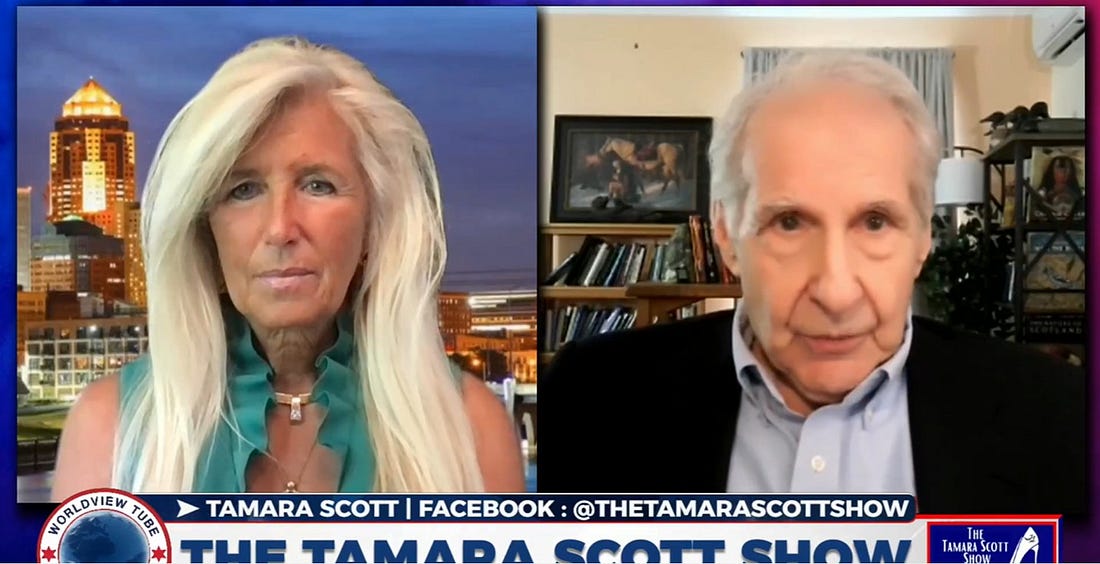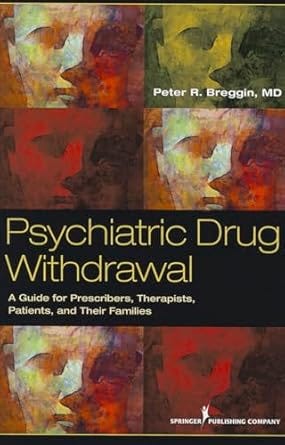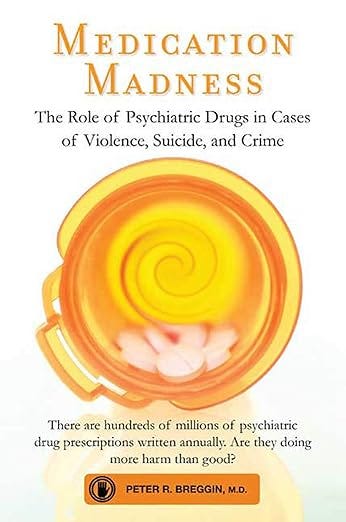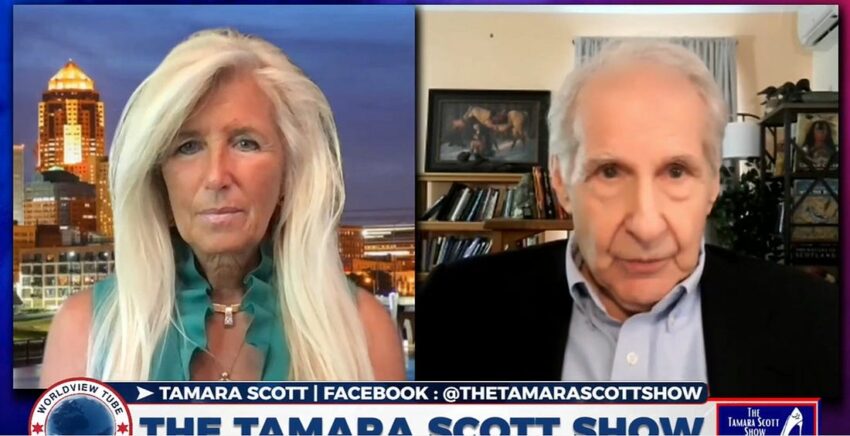Scrutinizing violence’s ties to antidepressants
“In too many cases, psychiatric drugs cause or contribute to horrendous acts of violence.”

Click here to watch the interview.
Dr. Breggin and Tamara Scott discuss the New York shooter, motivation and mental illness.
In addition to sharing the interview, above, we are reprinting an article by Dr. Breggin, below, that was published by Variety in 2013. The information is as important now as it was over a decade ago. Sadly, nothing has changed regarding psychiatry’s reliance on drugs to treat human distress and trauma.
Breggin Alerts! Exposing Global Predators is a reader-supported publication. To receive new posts and support my work, consider becoming a free or paid subscriber.
Published in Variety Jan 18, 2013
Scrutinizing violence’s ties to antidepressants
by Peter R. Breggin, MD
Peter R. Breggin, MD, is a psychiatrist and the author of many books and scientific articles dealing with adverse drug effects, including “Medication Madness” (2008). His latest book is “Psychiatric Drug Withdrawal: A Guidebook for Prescribers, Therapists, Patients and Their Families” (2013).
Huge efforts have been made by the pharmaceutical industry to prevent the public and the health professions from knowing that antidepressant drugs can cause violence and suicide.
Joe Wesbecker had threatened his co-workers in the past, but had never been violent. In 1989, Wesbecker was placed on Prozac (fluoxetine). One month later, he became agitated and delusional. Suspecting Prozac as the cause, his psychiatrist stopped the antidepressant. Two days later, with most of the drug remaining in his system, a heavily armed Wesbecker walked into his former place of work in Louisville, Ky., where he killed eight people and wounded many others.
Survivors and families of the deceased sued Eli Lilly for negligence in developing and marketing Prozac, and the case went to trial in 1994. A consortium of lawyers and an Indiana court had appointed me to be medical and scientific expert for more than 100 combined product liability suits against Eli Lilly concerning violence and suicide caused by Prozac. In that role, I became the scientific and medical expert in the Wesbecker case.
The lawyer handling the Wesbecker case died, and when the new attorney took over, he seemed to thwart every attempt I made to help us both prepare for trial. He did not tell me about huge amounts of new information, wouldn’t talk with me on the phone. The night before the trial, he still refused to discuss anything with me, and in frustration, I shoved a carefully prepared series of notecards into his hand, saying, “You must ask me these questions or we’ll lose the trial.”
When I testified the following day, the attorney tried to stifle some of my most telling testimony in support of his case against Eli Lilly. Several jurors voted to find the company negligent, but Lilly won the trial by a 9-3 vote. One more vote against the company, and it would have been a hung jury. Eli Lilly and the major media reported the trial as if it had wholly and forever exonerated Prozac and the company.
“In too many cases, psychiatric drugs cause or contribute to horrendous acts of violence.”
Afterward, I couldn’t figure out if the lawyer in the Wesbecker case was incompetent or, as my wife Ginger suspected, he had been bought in advance by Eli Lilly to throw the case. The trial judge, John Potter, later discovered that the trial had indeed been fixed.
Judge Potter threw out the rigged jury trial and changed the result to settled “with prejudice” by the drug company. This time major media failed to cover the incredible turnabout in the case. Although I have written about it extensively in my book “Medication Madness” (2008), the real outcome of the trial to this day remains relatively unknown even among psychiatric and legal experts.
Columbine
In 1999, Eric Harris, along with Dylan Klebold, slaughtered students and a faculty member at Columbine High School in Colorado. I was a psychiatric expert in several cases surrounding the Columbine massacre, none of which went to trial. From the medical records, I discovered that Harris had been prescribed the antidepressant Luvox one year earlier, before he became profoundly disturbed. Harris remained on Luvox over the next year, becoming increasingly filled with hate and violence. On autopsy, he had a significant level of Luvox in his bloodstream.
A 16-year-old boy in Manitoba, Canada, abruptly plunged a knife into the chest of one his best friends, killing him. The youngster, with no history of violence or serious mental illness, had been put on Prozac three months before the murder. When his mother told the psychiatrist that Prozac was making her son worse, the doctor increased the dose. Seventeen days later, with no significant provocation, the teenager killed his friend.
Aurora
Before he committed the massacre in the theater in Aurora, Colo., in 2012, James Holmes was in psychiatric treatment at his university clinic. Given that he was in treatment with a psychiatrist who was worried about his dangerousness, it is almost certain that Holmes was either taking psychiatric drugs or in withdrawal from them at the time he committed murder.
We do not know if the Newtown shooter, Adam Lanza, was taking psychiatric medication at the time of the shootings, although a Dec. 14 Washington Post article reported that a family friend said “he was on medication.” There are many suggestions that this socially withdrawn individual had been psychiatrically diagnosed and treated.
Notice that all five individuals (Wesbecker, Harris, Holmes, Lanza, and the Canadian teenager) were already under psychiatric care shortly before or when they committed violence. In addition, the Virginia Tech shooter was psychiatrically hospitalized a year before he murdered his classmates.
These events confirm that involvement in psychiatric treatment, with its emphasis on prescribing psychoactive drugs, is no protection against violence perpetrators. Instead, in too many cases, psychiatric drugs cause or contribute to horrendous acts of violence. Psychiatry is a cause and not a cure for mass violence, and looking for help from psychiatry will only distract us from seeking genuinely effective solutions.
~end~


[Editors’ note: We also want to acknowledge A Midwestern Doctor’s Substack column and his other efforts to alert patients and families to the deadly dangers of psychiatric drugs.]
| Psychiatric drugs are intended to subdue us |
| DR. PETER AND GINGER BREGGIN·SEPTEMBER 13, 2024 |
 |
| [click on the headline above to go to the full article to read and to comment] |
| Read full story |
| Luvox (fluvoxamine): Too dangerous to treat COVID |
| DR. PETER AND GINGER BREGGIN·MARCH 24, 2024 |
 |
| by Peter R. Breggin, MD |
| Read full story |
| 80% Of Population Takes Psychiatric Drugs and Gets Worse |
| DR. PETER AND GINGER BREGGIN·NOVEMBER 5, 2023 |
 |
| Author: Peter R. Breggin, MD |
| Read full story |
Breggin Alerts! Exposing Global Predators is a reader-supported publication. To receive new posts and support our work, consider becoming a free or paid subscriber.
Invite your friends and earn rewards
If you enjoy Breggin Alerts! Exposing Global Predators, share it with your friends and earn rewards when they subscribe.
Click this link for the original source of this article.
Author: brianpeckford
This content is courtesy of, and owned and copyrighted by, https://peckford42.wordpress.com and its author. This content is made available by use of the public RSS feed offered by the host site and is used for educational purposes only. If you are the author or represent the host site and would like this content removed now and in the future, please contact USSANews.com using the email address in the Contact page found in the website menu.









